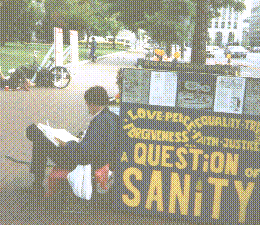The following three papers discuss the various ways a
Constitutional Amendment may be effected in the United States.
**************************************************************
[In 1990 and 1991, Joseph Vigorito wrote this and the following
two papers about Constitutional Amendments -- "ARTICLE V, U.S.
CONSTITUTION: the Article of Change," and "CONSTITUTIONAL
CONVENTIONS-SOME INFORMATION" -- which we believe are of interest
to anyone considering a Constitutional Amendment. The following
is a result of his research, slightly edited to bring it up to
1995. Ellen Thomas, Editor]
**************************************************************
When considering the mechanics of how to eliminate nuclear
weapons, only amendments to the constitutions of all the nuclear
powers, roughly at the same time, is likely to work. Congress
and the President, with all the pressures placed on them
by the multi-billion dollar defense industry, won't eliminate
these weapons without the mandate of the people and the force of
Constitutional law. Non-binding resolutions and referenda have
been ignored all too easily. This government won't do it unless
the people will.
The initiative process, coupled with the provisions of Article V
of the U.S. Constitution, combine to directly provide the people
with a practical method of solving the mega-overkill problem by
amending their Constitution. Given the inaction of their elected
officials, the only constitutional alternative left to the people
is the "sovereign power" vested, by the Constitution, in the
people. This power is manifest in the initiative process.
As President Woodrow Wilson put it, "In order to clean house the
one thing we need is a good broom. Initiatives and referendums
are good brooms."
Therefore, with care toward correct wording of each initiative's
text -- to insure that the initiative cannot be struck down by
the courts for "stepping on the President's toes" -- there is no
impediment to amending the Constitution by winning the election
in '96.
In all other constitutional theories the power is placed
somewhere else. The British theory for example: "According to
the English Constitution, absolute despotic power must reside
somewhere in all governments, and in Britain this power is
entrusted to Parliament." (Maxwell vs. Goetschius, 40 NJL 383.)
In the U.S., however, no less than 20 federal precedents affirm
that "sovereign power" resides in the people.
"The theory of the American political system is that the
ultimate sovereignty is in the people collectively, acting
through the medium of constitutions to create such governmental
agencies, endow them with such powers, and subject them to such
limitations as in their wisdom will best promote the 'Common
Good.'" (First Trust Co. v. Smith, 277 NW 762. Cited Am.Jr.
2nd.)
Amendments to the Constitution -- [authorized by Article V in the
U.S. Constitution and by similar clauses in other nations'
constitutions] -- only occur when fundamental changes are
required -- changes that are so basic and broad that nothing but
a constitutional change could provide a remedy. The right of
women to vote and the right not to be enslaved could never have
been legislated with any lasting effect by some lesser means.
It is this lasting effect, within the framework of each individual
country's own laws, that must be achieved in order to promote
trust in the inter-relations of countries.

